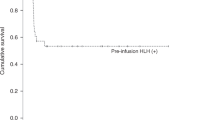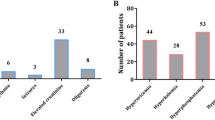Summary:
We report a 30-year-old patient with therapy-refractory T-ALL undergoing unrelated allogeneic PBSCT. He developed severe tumor lysis syndrome (TLS) with extreme biochemical changes, cardiac and neurological symptoms and dialysis-dependent acute renal failure after TBI (4 Gy) on the first day of reduced intensity conditioning (RIC) for unrelated allogeneic PBSCT. The patient's clinical condition was stabilized after beginning daily hemodialysis and treatment for disturbed electrolytes, metabolic acidosis and plasma coagulation, as well as reduction of uric acid by rasburicase. The conditioning therapy and the allogenic PBSCT were scheduled according to the preparative regimen. According to our knowledge, severe TLS induced by 4 Gy TBI has not been reported so far. Regimen-related toxicity using RIC regimen was mild, allowing 30–50% of the patients to have an entirely outpatient transplantation. However, we would like to point out that severe TLS could also complicate PBSCT using RIC regimens in patients with relatively radiation-sensitive malignancies and high tumor burden.
This is a preview of subscription content, access via your institution
Access options
Subscribe to this journal
Receive 12 print issues and online access
$259.00 per year
only $21.58 per issue
Buy this article
- Purchase on Springer Link
- Instant access to full article PDF
Prices may be subject to local taxes which are calculated during checkout
Similar content being viewed by others
References
Ezzone S . Tumor lysis syndrome. Semin Oncol Nurs 1999; 15: 202–208.
Altmann A . Acute TLS. Semin Oncol 2001; 28 (Suppl. 5): 3–8.
Sallan S . Management of acute TLS. Semin Oncol 2001; 28 (Suppl. 5): 9–12.
Fleming DR, Doukas M . Acute TLS in hematologic malignancies. Leuk Lymphoma 1992; 8: 315–318.
Razis E, Arlin Z, Ahmed T et al. Incidence and treatment of TLS in patients with acute leukemia. Acta Haematol 1994; 91: 171–174.
Nomdedeu J, Martino R, Sureda A et al. Acute tumor lysis syndrome complicating therapy for bone marrow transplantation in a patient with chronic lymphocytic leukemia. Bone Marrow Transplant 1994; 13: 659–660.
Fleming DR, Henslee-Downey PJ, Coffey CW . Radiation-induced acute tumor lysis syndrome in the bone marrow transplant setting. Bone Marrow Transplant 1991; 8: 235–236.
Lerza R, Botta M, Barsotti B et al. Dexamethasone-induced acute tumor lysis syndrome in a T-cell malignant lymphoma. Leuk Lymphoma 2002; 43: 1129–1132.
Feinstin L, Storb R . Reducing transplant toxicity. Curr Opin Hematol 2001; 8: 342–348.
Mc Sweeney PA, Niederwieser D, Shizuru JA et al. Hematopoietic cell transplantation in older patients with hematologic malignancies: replacing high-dose cytotoxic therapy with graft-versus-tumor effects. Blood 2001; 97: 3390–3400.
Nagler A, Slavin S, Varadi G et al. Allogeneic peripheral blood stem cell transplantation using a fludarabine-based low intensity conditioning regimen for malignant lymphoma. Bone Marrow Transplant 2000; 25: 1021–1028.
Author information
Authors and Affiliations
Rights and permissions
About this article
Cite this article
Linck, D., Basara, N., Tran, V. et al. Peracute onset of severe tumor lysis syndrome immediately after 4 Gy fractionated TBI as part of reduced intensity preparative regimen in a patient with T-ALL with high tumor burden. Bone Marrow Transplant 31, 935–937 (2003). https://doi.org/10.1038/sj.bmt.1704025
Received:
Accepted:
Published:
Issue Date:
DOI: https://doi.org/10.1038/sj.bmt.1704025



